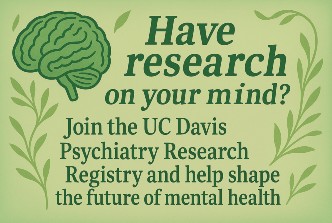Participate in a research study

Ages: 4-12 years
Keywords:
child, behavior
AIR Study
Description:
We are doing research to better understand aggressive behavior in children and teens. Right now, there isn't a clear diagnosis for this kind of behavior, even though it affects many families. We're testing a short questionnaire to see how well it help doctors learn about aggression and find better ways to treat it. By joining this study, you can your child can help researchers improve care for other families facing similar challenges.
Recruitment Period:
Recruitment period is currently open and we are offering compensation.

Ages: 15-21 years
Keywords:
depression, mood, suicidal thoughts, mental health, TMS
Brain Stimulation Pilot Study
Description:
We are doing a research study to see if a treatment called Transcranial Magnetic Stimulation (TMS) can help people who feel depressed and have had thoughts of suicide. TMS sends magnetic pulses to the brain to help improve mood. Study volunteers will get this treatment for 5 days and come back for a few check-ins over about 5 weeks.
Recruitment Period:
Recruitment period is currently open and we are offering compensation.
Visit the Brain Stimulation Pilot study page for more details

Ages: 22-70 years
Keywords:
depression, major depression, deep brain stimulation, major depressive disorder, MDD, treatment resistant depression
TRANSCEND Study: Deep Brain Stimulation for Treatment Resistant Depression
Description:
The TRANSCEND Study is a clinical study for people with depression who have been unable to find relief from their symptoms after trying at least four different antidepressant treatments. The goal of the study is to evaluate the safety and effectiveness of deep brain stimulation (DBS) as an investigational therapy to treat treatment resistant depression (TRD) using the Infinity DBS System.
DBS involves a surgical procedure during which electrodes are placed in the brain. The DBS electrodes will stimulate an area in the brain thought to help reduce the symptoms of depression.
Recruitment Period:
Recruitment period is currently open.

Psychiatry Research Registry
The Department of Psychiatry and Behavioral Sciences works to improve mental health through research. We study many topics, like new treatments and ways to better understand mental health symptoms.
By signing up for our research registry, you can learn about current and future studies that match your interests. Whether you want to help with new discoveries or support mental health research, joining our registry is a great way to make a difference.

Ages: 15–20 years
Keywords:
Sleep, hours needed, teenage years, children, adolescents, sleep schedule, sleep lab
Adolescent Sleep Study
Description:
We need participants to help with our sleep research!
Researchers at the UC Davis Sleep Lab are seeking to answer the question about how much sleep children need and if this need changes across the teenage years. We are looking for participants who are 15 to 20 years old and live in Davis, Dixon or Woodland.
Recruitment Period:
Currently open and offering financial compensation for participation.

Ages: 8–13 years
Keywords:
virtual reality, children, teenagers, ADHD, attention deficit hyperactivity disorder
Virtual Reality Attention Management, VRAM study
Description:
Researchers at the UC Davis MIND Institute are using a virtual reality environment to test whether a new intervention can help persons with attention problems or who have ADHD with significant inattention, learn to ignore distractions, e.g., peers talking, clock ticking.
Recruitment Period:
We are actively recruiting young children and teenagers with ADHD to participate in the study.

Ages: 15–30 years
Keywords:
ADHD, attention deficit hyperactivity disorder, teens, young adults, self control, impulsivity
MINT Study, Mapping Impulsivity Neurodevelopmental Trajectories
Description:
Are you 15 to 30 years old? Help science learn about self-control and decision making in the growing brain!
We are studying brain development in teens and young adults to discover more about how self-control develops. Attention deficit/hyperactivity disorder (ADHD) is associated with even higher rates of impulsivity and self-control problems. Findings from this study may help us better understand the development of self-control in adolescents and young adults with and without ADHD.
Recruitment Period:
We are actively recruiting teenagers and young adults to participate in this study. Compensation is available.
